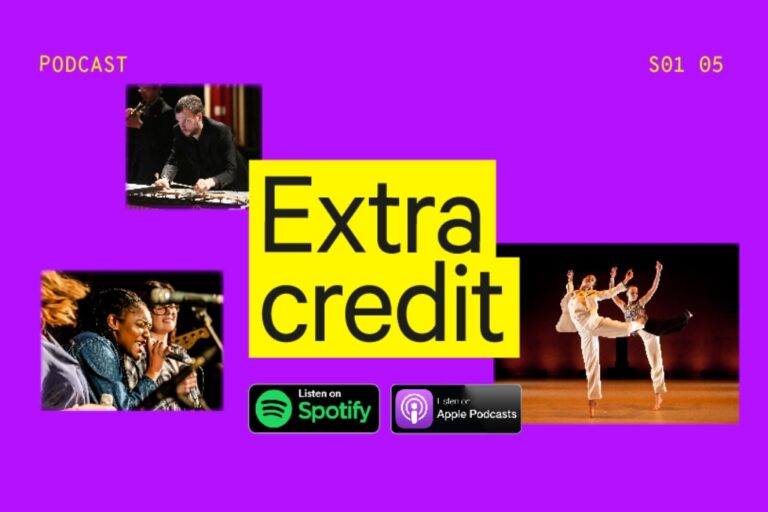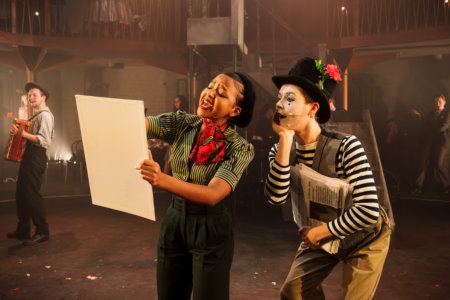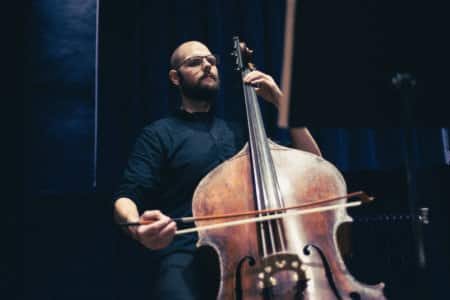
Tales of triumph emerge from the corridors of Trinity Laban Conservatoire of Music and Dance every day. Here, creativity dances hand in hand with passion, nurturing students into not just artists, but versatile professionals, too. Two graduates have success stories to prove it.
Tom Self, an actor, composer, and musical director, embodies the essence of entrepreneurial spirit, his ventures resonating across the UK’s cultural landscape. Meanwhile, Becca Wickes commands stages with a captivating presence, her performances weaving tales of intrigue and emotion.
On this episode of Extra Credit, we unravel their journeys, tracing the influence of Trinity Laban’s training on their artistic endeavours. Listen below, and wherever you get your podcasts.
The transcript below has been lightly edited for grammar, spelling and clarity.
1. If we could talk a bit about the multidisciplinary aspect of studying musical theatre at Trinity Laban and how this three-year training programme can lead to several different career paths.
Becca:
I think because the course is so evenly split on each discipline, it really does set you up for multiple different career options. You are so well trained in the musical department, the dance department and the acting department that you could really go into into either sector. You just have such individual training on all of them.
What was so amazing for me was there were so few of us in the class. You actually had personal relationships with the teachers and individual training where every teacher knew your strengths and weaknesses and you are able to explore each option of the course.
Tom:
They cover so much on the course, which, I think in an industry that is constantly evolving, is important. For me, the actor/musician thing was a thread, I didn’t know that was going to become a thread in my life. We never really talked about active musicianship on the course. But looking back on it, there were so many threads of that within lots of different lessons within dance, within music and within music theory. I think that’s a strength of the course — that it just covers so much ground more without you probably realising it.
2. Would you both say that you left Trinity Laban with a very clear idea of what you were going to specialise in or perhaps the first thing you were going to try out professionally?
Becca:
I’ve always known what I wanted to do and then my training kind of just solidified that. It was after my second-year show, that we did a show called “You’re in town.” And that was kind of the moment when I was like, “Yes, this, this is what I want to do for the rest of my life.”
I think that’s just where just where my strengths lie. I kind of knew very early on that that was going to be where I think I sat on where I’m most comfortable and most happy working.
Tom:
I knew from the minute I got there that the minute I left that it was going to be musical theatre.
The first job I did upon graduating was a kid’s workshop which led me to then being a musical director for a pantomime.
The skills were probably there without me realising. I’d never been a musical director in a professional capacity at all in my life. Everything about my training came into play.
I did then go back to performing and I’ve done lots of performing bits as well. But coming into the creative side with that performing knowledge was a great grounding, and as much of a strong grounding, as if I trained to be an MD for three years.
Becca:
One thing I think it’s imperative to know if you’re an aspiring professional, or want to be in the industry is there’s never certainty in the industry. You work on a contract or contract basis. In between that, you’re auditioning for your next your next job. Sometimes you can be waiting years until your next contract. That is sometimes the hardest part of the industry when you’re in that in-between period when you don’t necessarily know what show you’re going to be doing next.
One thing I think that Trinity sets you up for very well is those in-between periods, when I was training there was there were parts in our syllabus and our course that were, “What can you do that also is performing but doesn’t necessarily mean you’re on stage.”
To find other things that you could potentially do that were still somewhat within the performing world but weren’t actually on stage. It can be things like teaching performing, or you know, or teaching young children or anything like that or like gigging, which is something that I do quite a bit in between my job — at weddings or different party venues. Because it still is still performing. I’m still singing, I’m still getting to doing what I love, but it’s not necessarily onstage.
3. Do you feel like doing so many things within the industry has helped or influenced your approach to your favourite part of the industry?
Becca:
It just makes me even more grateful when I am performing. It sounds so cringy and so cliche, but it genuinely is no other feeling like when you’re on stage doing what you love most. I don’t think I’ll ever be able to describe that feeling. I think it makes all those days where you’re like, “Oh, I don’t know if I could do this anymore,” worth it. It makes you go, “Yes, this is why I’m doing what I’m doing. I love what I do more than anything.”
Tom:
100%. I think it keeps it really fresh as well. I’ve loved every job I’ve done. But the lovely thing about it is when you dip in and out or dabble in so many different areas. It means not only do you not know what the next job is, but where it’s going to be or what you’re going to be doing.
From my side, I’ve gone from behind a desk and doing side things to having to put my tap shoes on at the next job or even composing and doing a demo at the next.
It gives longevity to the industry as well. I’ve always been in it for the long run and lots of performance. It’s not for everyone because it’s a real hard, and it takes a certain type of person to go, “Okay, I don’t know when the next paycheck is coming, I don’t know where it’s coming from, but it’s gonna be fine.”
I think that’s the lovely thing to be able to do so many different things. It never gets boring. It’s always exciting.
4. What is the most memorable experience or performance that holds a special place in your heart?
Becca:
I’ve done shows that I really never thought in a million years I would ever get the chance to do. But there’s one show in particular which just holds a very special place in my heart.
When I first graduated in 2018, I did “We Will Rock You” on the Royal Caribbean. I learned so much on that job.
Then last year I did “We Will Rock You” again at the London Coliseum, which was my West End debut.
Growing up my dad would listen to Queen. It was the one band that I listened to throughout my entire childhood. It had a massive impact on why I listened to the sort of music I did and why I loved music and still love music now.
When I sang “No One But You,” which is just really like a vulnerable and exposing moment in the show, it was at the Colosseum which is a 3000-seater theatre, and my mom and dad were watching. I could see my mom and dad in the audience. That’s the moment in my life I felt “This is what I’ve always wanted to do.” I was there singing one of the greatest songs, in my opinion, ever written and knowing that my dad, grew up listening to Queen was there, it just meant a lot to me.
Tom:
I got to work on a revival of a show called The Secret Diary of Adrian Mole, which is quite small. Based on a book from the 80s.
A year and a half ago, I got the opportunity — they did an active musician revival version of it. So a whole new version of the show, and I got brought in to be the sort of musical director arranger of the show. I was a massive reworking of the show I’d loved for many years. I was like, “Wow, this is such a cool thing to work on.”
I got to work quite closely with Jacob and Pippa, who were the original writers and composers. I had to rearrange the whole thing so everybody could play certain instruments at certain points. It originally had some kids in the show then we had added adults.
And then I ended up in it. Playing an 89-year-old man. So it’s this project that grew and grew and grew. I remember getting to opening night, and it’s been so much work, and more work than I think I’d ever realised it would be. I was just standing there going, “Wow, I’ve been able to pull on so many different elements that I absolutely love about this industry and put them all into the one show.”
5. Having to take care of yourself and be quite resilient – are those competencies you feel you developed while training at Trinity Laban?
Becca:
When I was there it was very much taught to us the importance of looking after your body because that’s half the battle in this industry. Looking after yourself is so important especially when you’re on tour or doing that weekly touring of going to different venues every week.
Even things that seem so simple, like sleeping. Getting yours is so important. I’m very much somebody who has an overthinker brain. So when I was training and when I was stressed about a show, I’d just be exhausted 24/7.
But the importance of sleep, drinking water and making sure you’re eating your three decent meals a day, is very much taught to you at Trinity. We had a nutritionist come in at one point when we were on a show, to tell us, “This is what you need to make sure that you’re eating in a day to make sure that you’re fueling your body in the right way.”
Tom:
It’s just the nature of the industry, certain jobs are set up in better ways to deal with it. You have certain jobs where there are covers, and there are understudies, or there are holiday weeks, and there’s a set amount of days off, there will be other jobs that are just by nature shorter gigs, or there are no understudies. So, you have to also use the tools that the job’s giving you to sort of set yourself up and go, “Okay, I need to do X, Y, and Z because there isn’t this allowance for people to be ill.”
Obviously, everybody still gets ill. I think one of the lovely things about the world now, from when I trained 10 years ago, is there’s so much more conversation around mental health and mental well-being.
It was always talked about Trinity Laban. It was part of the focus when I was there.











